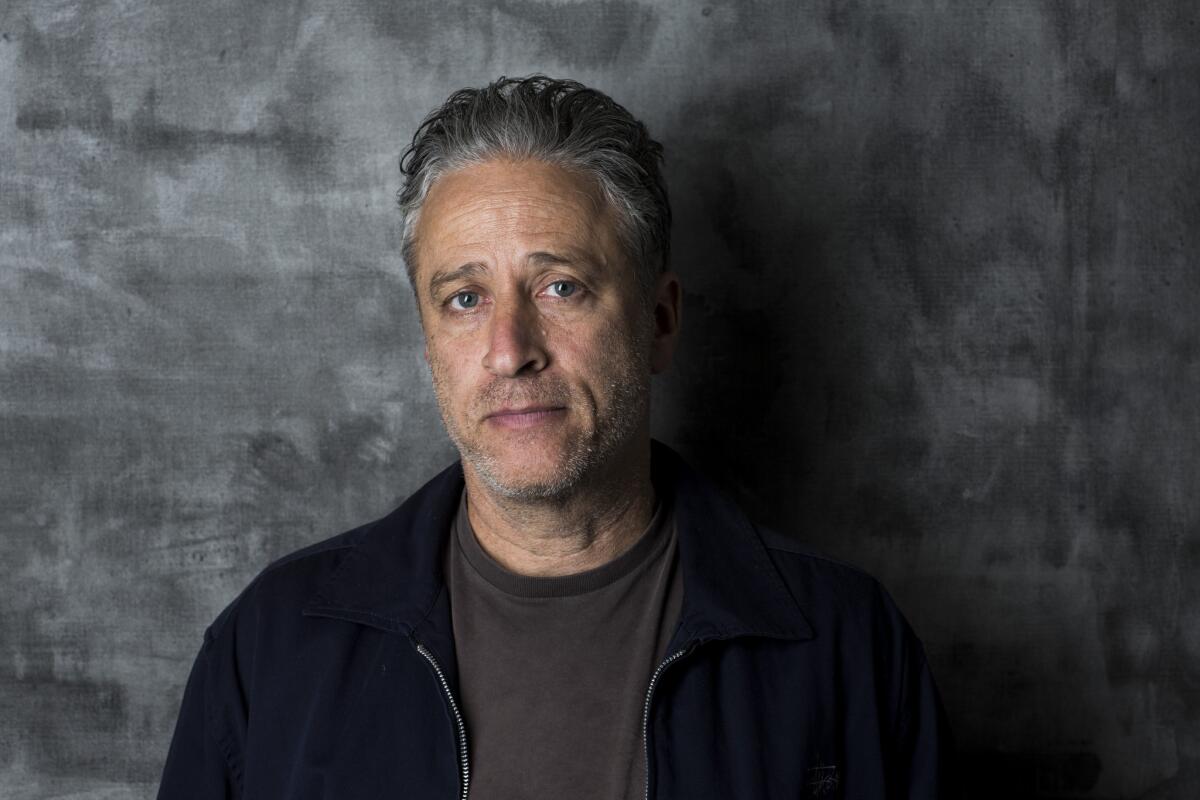Jon Stewart leaving ‘The Daily Show’ this year

Jon Stewart will step down as host of Comedy Central’s “The Daily Show” this year, ending a 16-year run that changed the way Americans view the news.
Stewart, 52, made the announcement to his studio audience as he recorded Tuesday night’s show in New York. Under his watch, “The Daily Show” navigated new frontiers in comedy and journalism. He tweaked newsmakers and news organizations with equal relish, along the way helping influence the media elites he frequently pilloried.
“In my heart I know it’s time for someone else to have the opportunity,” Stewart said. “I dont have any specific plans. ... I’ve got a lot of things in my head. I’m going to have dinner on a school night with my family.
“This show doesnt deserve any even slightly restless host, and neither do you,” he said.
“The Daily Show with Jon Stewart” had such wide-ranging impact that the authentic news outlets began to copy the program. MSNBC found a hit with Rachel Maddow, a host whose smirking delivery and arched eyebrow instantly recalled Stewart. On CNN, the usually sober Anderson Cooper delivered the “Ridiculist,” a snarky editorial segment that would have been hard to imagine on a news show in the pre-Stewart days.
“He’s been a really significant part of the civic conversation, at least since the 2000 elections,” said Robert Thompson, a professor at Syracuse University and director of the Bleier Center for Television & Popular Culture. “He and his colleagues at the ‘Daily Show’ did in a comedic mode what the folks at CBS, CNN, et al, should have been doing in a journalistic mode.”
Comedy Central confirmed Stewart’s exit, saying the hunt is on for a new host for the program, which premiered in 1996 under then-host Craig Kilborn.
“We haven’t set a date for his final show, but it will be sometime before the end of 2015,” Comedy Central President Michele Ganeless wrote in a statement.
“Through his unique voice and vision, ‘The Daily Show’ has become a cultural touchstone for millions of fans and an unparalleled platform for political comedy that will endure for years to come,” Ganeless said
Stewart offered no specifics on his plans. Last year he directed his first feature film, the political thriller “Rosewater.” The film earned respectful reviews but only modest box office.
Stewart and “The Daily Show” did not invent the satire of the TV anchor-desk format. David Frost skewered British politicians with his BBC show “That Was the Week That Was” during the early 1960s. And the “Weekend Update” segment — still a regular fixture on NBC’s “Saturday Night Live” — predates “Daily Show” by more than 20 years.
Stewart was 36 when he took “The Daily Show’s” helm in 1999, succeeding Kilborn, and turned the program into a news-focused powerhouse.
The show won the Emmy Award for best variety, music or comedy series 10 years in a row, from 2003 through 2012. In several of those years, it also earned Emmys for writing.
Although the series has typically averaged fewer than 3 million total viewers per night, according to Nielsen, it has amassed an influence beyond those numbers.
That is especially true among young people, who found in Stewart a sentinel for their disaffection with a mainstream media and a political culture they viewed with suspicion and increasingly found out of touch.
Not content simply to crack wise about newsmakers and journalists, he directed zingers that came with a heartfelt edge, the wise fool raging against hypocrisy, with a pulpit that began to extend beyond “Daily Show” itself.
In 2004, he visited CNN’s political talk show “Crossfire” — featuring guests who often shouted above each other in delivering their talking points — and promptly attacked the program for lowering the terms of Beltway debate.
“I have privately, amongst my friends and also in occasional newspapers and television shows, mentioned this show as being bad,” Stewart said on-air. “It’s not so much that it’s bad, as it’s hurting America.”
Jonathan Klein, CNN’s then-chief, later said Stewart’s attack facilitated his decision to cancel the show the following year. (CNN recently revived “Crossfire” but canceled it again in October.)
Stewart was a standup comic struggling to find the right TV hosting perch when he got the “Daily Show” gig. Since then, he has become a comedy impresario of sorts, giving crucial breaks to such stars as Stephen Colbert, Steve Carell, Ed Helms, John Oliver, Samantha Bee and, more recently, Aasif Mandvi and Hasan Minhaj.
Colbert left in 2005 to start a spin-off, “The Colbert Report,” which became a brand unto itself, with the title star playing a bombastic conservative talk host loosely modeled on Fox News’ Bill O’Reilly.
Colbert ended his run on that program to take David Letterman’s job on CBS’ “Late Show.” Comedy Central replaced his show with a new one starring longtime comedy writer-producer Larry Wilmore.
The departure of Stewart may create a tougher-to-fill void.
In her statement, Ganeless signaled an intention to keep the “Daily Show” brand intact. But that could still mean changes beyond just the host. After Stewart’s arrival, the program moved away from silly comedy to more pointed, topical material.
One possible replacement would be Oliver, the British-born host who won raves as a fill-in host for Stewart in 2013 and who now hosts HBO’s “Last Week Tonight.” But Oliver said last week he has no intention of leaving: “I love it here. I can do anything,” he said at a press breakfast.
Whatever Comedy Central does next, Stewart has given the next host a tough act to follow.
As Thompson said, “I pity the poor fool who has to fill the shoes of Jon Stewart.”
Times staff writer Lauren Raab contributed to this report.
Twitter: @scottcollinsLAT
More to Read
The complete guide to home viewing
Get Screen Gab for everything about the TV shows and streaming movies everyone’s talking about.
You may occasionally receive promotional content from the Los Angeles Times.







